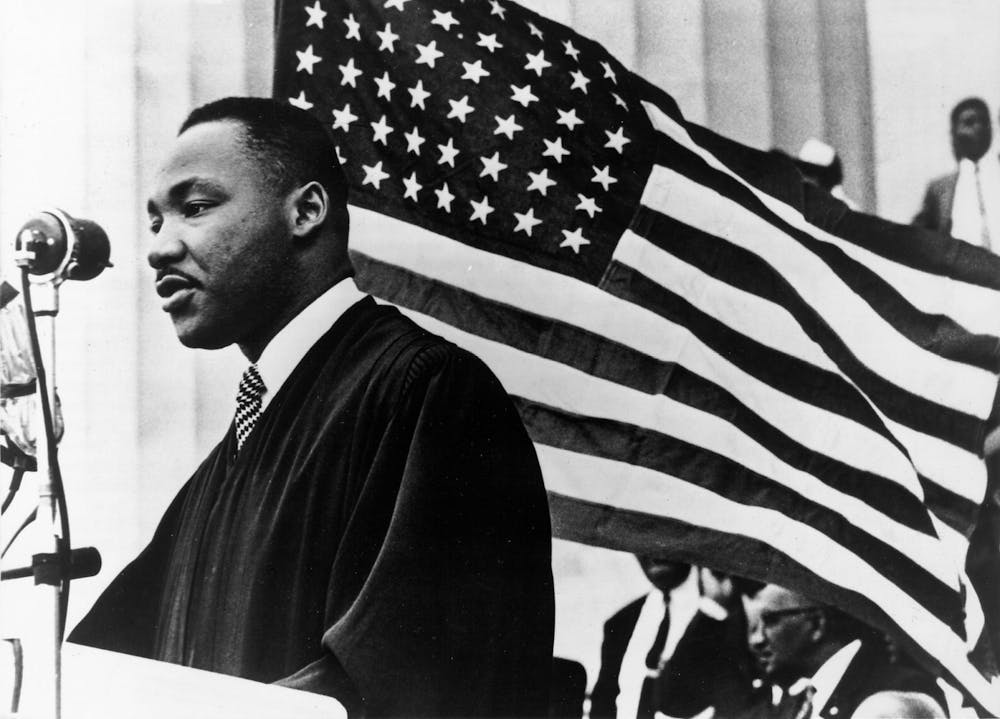Since the death of George Floyd at the hands of a former Minneapolis police officer on May 25, people all across the country and around the world have been protesting against police brutality. While most of the protesting appears to be peaceful, there have also been instances of destruction, including setting fires, breaking windows and vandalizing police cars.
As a result, many have turned to platforms such as Twitter to decry this aspect of the protests. While browsing these 280 character condemnations, I found that many people are citing Martin Luther King’s Jr.’s preference for peaceful protests.
“Violence begets violence - Martin Luther King Jr. Keep it peaceful, Westminster protestors, or you will lose support,” tweeted English broadcaster Piers Morgan.
“Democrats are trashing everything Martin Luther King, Jr. stood for,” tweeted another user.
These reactions are yet another example in a long line of instances where people have cherry picked from King’s plethora of quotations and beliefs in order to serve a specific political purpose. I can’t help but be infuriated by this, as it seems to me that these people are treating King like a prop to be used when it is most convenient for them.
King was an incredible civil rights leader, but he was also a democratic socialist, an advocate for some form of a universal basic income and a critic of U.S. imperialism. When looking to King’s legacy for guidance, we should stop cherry picking and start considering the merits of his full spectrum of beliefs and ideas.
Frustratingly, these aspects of King’s politics are almost completely ignored. When I was growing up, I only learned about King when the Civil Rights era of the 1960’s was being discussed.
When I got older, however, I began to learn about some of King’s other beliefs on my own and found myself surprised that his views on other issues were never taught to me in school.
For example, in 1966, King spoke to his staff about the concept of democratic socialism.
“[W]e are saying that something is wrong... with capitalism.... There must be better distribution of wealth and maybe America must move toward a democratic socialism. Call it what you may, call it democracy, or call it democratic socialism, but there must be a better distribution of wealth within this country for all of God’s children,” King said.
This is something I never heard about until I was in college. I was completely taken aback and confused as to why these ideas had been kept from me in my previous education.
King was also a critic of the U.S.’s tendencies towards imperialism when it comes to the use of the military. In 1967, King delivered a speech titled “Beyond Vietnam,” in which he spoke about these issues in relation to the ongoing Vietnam War and its effect on Vietnam’s own citizens.
“They must weep as the bulldozers roar through their areas preparing to destroy the precious trees. They wander into the hospitals with at least twenty casualties from American firepower for one Vietcong-inflicted injury. So far we may have killed a million of them, mostly children,” King said. “We have destroyed their two most cherished institutions: the family and the village.”
Why are speeches such as “Beyond Vietnam” ignored? Why do the same people who cite King when civil rights are brought up completely disregard other beliefs that he held? I look at the people who are quoting King right now in an effort to squash completely justified outrage at America’s systematic racism and feel anger at what is a clear example of King being used as a prop.
If we are to look at King as an example of someone who fought against injustice, we ought to consider his full range of beliefs. This isn’t to say that you are never allowed to disagree with certain ideas he proposed. It is perfectly natural to align yourself with some of a person’s ideas while disagreeing with others.
But these other beliefs of King are hardly even discussed in the political sphere, much less taught in school. It’s time to learn about King’s legacy in full, and time to stop quoting him only when it’s convenient to a political angle.
Molly Hayes (she/her) is a rising junior studying English. She plans to earn a Master of Library Science.






